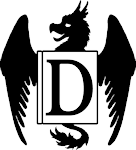The Last Dragon
Silvana De Mari, translated by Shaun Whiteside
Scholastic (Miramax)
Fiction, MG Fantasy/Humor
Themes: Dragons, Fantasy Races, Fairy Tales, Libraries
***+
Description
Lost and alone in a world gone to mud and flood and ruin, the elf pup Yorsh stumbles his way through human lands where his kind is feared and hated. When he falls into
the reluctant company of a woman and a man, it seems mere luck - but perhaps it is prophecy. Carved in the lost Runic language beneath the city of Daligar are words that
seem to apply directly to Yorsh. They tell of the last elf, who will end the age of suffering when he finds the last dragon. There's also a bit about marriage, but Yorsh
doesn't have much time to linger, with the soldiers of Daligar on their heels and the almighty judge screaming for blood.
There must've been even more Yorsh didn't see to that prophecy. Many years later, he is indeed in the company of the last dragon, in a lost library of ancient knowledge,
and the rains have ended... but Daligar is more miserable than ever in the grip of the tyrannical judge. It will take all of Yorsh's untested elven magic and knowledge,
the grit of a girl jaded by a lifetime of abandonment and hardship, and the strength of the dragon to bring the prophecy's promised happy ending to pass, if it can even
be done at all.
Review
This is a much odder duck of a story than it appears. At first glance, it looks fairly simple, even silly. Young Yorsh doesn't understand human ways or limitations,
his misunderstandings being both a curse (as when they make things much worse for his long-suffering companions) and a boon (as when ignorance allows him to act where
others would give up, and to cling to hope in the face of impossible odds.) De Mari manages a tightrope walk between keeping the tale amusing and giving the situation
enough weight and depth to engage me, Yorsh's antics (usually) falling just shy of utterly irritating.
Then I turned the page to begin Part 2, and the story really picked up.
It was no longer just about following a prophecy's breadcrumb trail to a foregone happy ending, but about how prejudice, hate, and fear create a vicious cycle in which
everyone suffers. Nobody is immune, either. Yorsh, despite all his reading, still (and increasingly implausibly, given his extensive time reading the great library, plus
his elfish ability to see glimpses of the thoughts of others) doesn't understand humans. Erbrow the dragon embodies his race's arrogance (and at least one reason they're
extinct, save himself.) The humans of Daligar still hate elves, who are only memories and fairy tales, but also hate each other. These twists gave the story renewed life,
builiding at last to a powerful ending.
So what held it back from the top rating? At some point, the twists started feeling a little like manipulations. I also wasn't sure I bought Yorsh's persistent naivete and
the speed fo his subsequent change of heart. The girl Robi also undergoes a suspicioiusly quick alteration in beliefs, given how long she's been under Daligar's heel and
how much she's suffered. The judge never really becomes more than a madman given too much power, with rather minimal direct involvement for being the main antagonist; given
how others transformed over the course of the story, I expected more from him, or at least his offspring, who in some ways suffered the worst from his instability.
Overall, I found it mostly enjoyable, with a unique style. There were just a hair too many hiccups and letdowns for me to quite grant it a full fourth star in the ratings,
though I expect others, particularly younger readers, will be too swept up in the adventure and more-than-fairy-tale-deep characters to notice.
